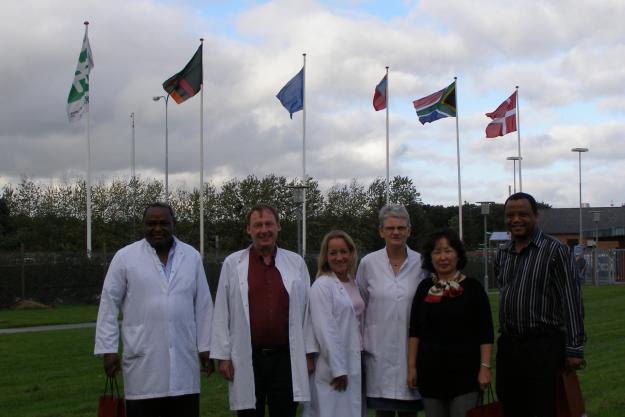
OPCW Associate Programme 2008 participants received training on how to run a modern chemical company in the DANISCO plant in Grindsted, Denmark. From left to right: Mr Katongo Chipompo from Zambia, professor Lars Wiebe, scientist Anita Lindahl, technician Sonja Lyngaas, Ms Oyun Batsukh from Mongolia and Mr Mashilo Mehale from South Africa.
By: Professor Lars Wiebe, Scientific Director, DANISCO
DANISCO was one of the European companies that trained participants of the OPCW Associate Programme 2008. The participants, who came from developing countries (Mongolia, South Africa, and Zambia), received training and information on how to run a modern chemical company in the DANISCO plant in Grindsted, Denmark.
The motto of DANISCO is: “First you add knowledge”, a concept which is deeply integrated within the company.
The programme had a fixed three-week training schedule where the participants undertook a project that pertained to the working of a modern chemical industry, as defined by the host company.
In addition, the participants gained a wider knowledge on how a modern company operates in the following areas:
- quality control;
- quality assurance;
- logistics, including the handling goods under inspection;
- environmental issues and how specifications required by authorities are met;
- safety issues;
- management levels functions;
- efficient communication;
- how groups can work together productively;
- providing the best service to DANISCO’s customers;
- contributing to an efficient workflow; and
- corporate SHEQ (safety, health, environment, and quality).
The participants also had the opportunity to understand and appreciate the values that govern DANISCO as defined below:
- We create value: Value for customers through a profound understanding of their business, demands, and needs.
- We are innovative: Open-minded about new ideas and new ways of doing things.
- We build competencies: A challenging working environment, continuous learning and development.
- We take responsibility: For the quality and safety of our products; and for safety at work place.
- We believe in dialogue: We listen, discuss, and invest time in dialogue (both internal and external).
In particular, quality-control performance indicators were discussed with the participants. These included:
- inspection and test reports;
- reports on any defects observed;
- process monitoring;
- audit observations;
- relevant regulatory authorities or customer observations;
- staff observations and reports;
- areas of complaints or service complaints;
- complaints of work overload;
- regular non-conformance reporting; and
- untidy work areas.
The key aspects that the participants observed were:
- values:
- the quality and safety of products; and
- the safety of the working environment;
- the working culture (the open-door policy and the encouragement of informal interactions);
- the self-sufficiency and independence of the working teams;
- the importance of teamwork;
- multi-skilled (integrated skills development) essential process development;
- the importance of effective communication; and
- deep respect for and trust in the employees.
The feedback received from the participants in the Associate Programme was very positive. They not only learnt about the functions of a modern chemical company, but also acquired skills that would be useful in the implementation of operating methods (such as safety procedures in industry, which would greatly help them in their respective countries).
DANISCO was pleased to host the participants of the OPCW Associate Programme, because this enabled the company to contribute to them gaining a better understanding of the importance of high standards and the quality of safety controls in the manufacturing process — two key elements which affect everyone worldwide, irrespective of where they live.
